UMMC students volunteer for ‘army’ fighting novel coronavirus
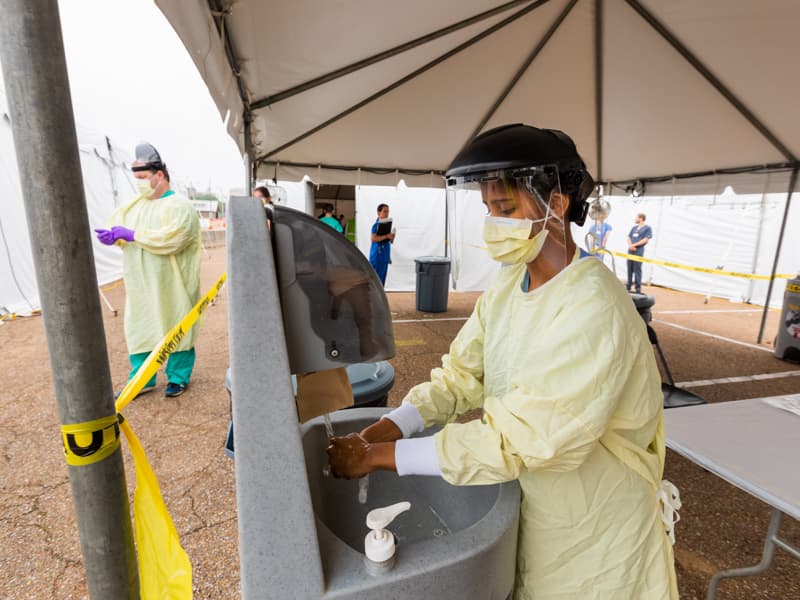
The University of Mississippi Medical Center is responding to the COVID-19 crisis with an army of employees dedicated to protecting the health of Mississippians.
But there’s another army with the same mission, marching on a strictly volunteer basis: UMMC students.
Early last week Dr. Jerry Clark, chief student affairs officer, emailed all students asking for volunteers to help work various mission-connected activities like COVID-19 hotlines, testing sites on campus and at the fairgrounds, providing logistical support to hospital’s management of the new visitor’s policy and countless other needed jobs.
Immediately an overwhelming response from students began to pour in.
Since then, 247 students from all seven schools have been deployed to different areas on and off campus, including the Mississippi Department of Health lab and the Mississippi Emergency Management Agency in Pearl. Another 90 students are on standby.
The huge participation and willingness to do whatever was asked of them made two things clear: they are in the right profession, and their hearts are in the right places.
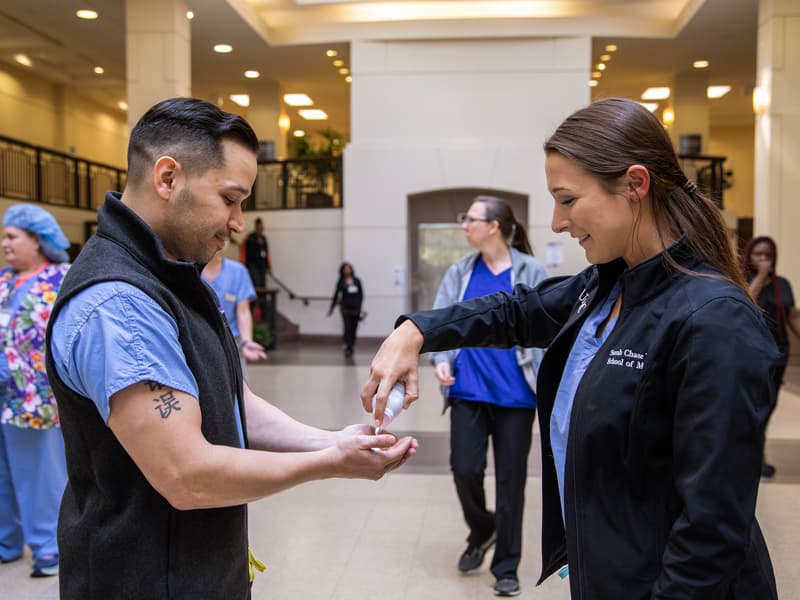
MD/PhD student Ezekiel “Zeke” Gonzalez chairs the COVID-19 Student Response Coordination Team, or CSRCTeam for short. Since last week he has been spending his time developing call scripts, crafting mass emails, communicating with the other 16 team leaders, leading teleconferences and manning the on-campus employee/student testing site, which has recently been moved to the fairgrounds.
“It’s almost like a small business popped up in 24 hours. I’m busier than I’ve ever been,” said Gonzalez, who is simultaneously pursuing two degrees with the goal of becoming a physician scientist.
Clark has been part of the group of Medical Center administrators who’ve vetted the service opportunities for students and provided guidance and resources, along with Chief Academic Officer Dr. Ralph Didlake and Dr. David Fowler. Fowler, chief institutional research officer, built a digital database of students so team leaders can quickly gain information about each volunteer’s skill set, interest, contact information and availability.
Clark said the 17 student coordinators, Gonzalez included, took “an idea and a tiny bit of guidance and built an army that’s making a difference.”
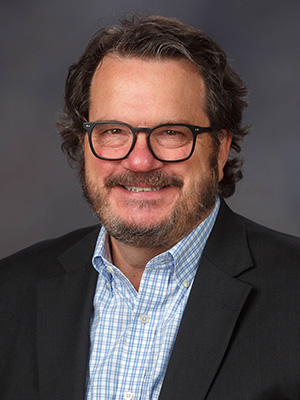
“It’s made me proud to be a Mississippian, proud to work for this institution, proud of the caliber of student we produce,” he said.
Students have had their academic lives turned upside down and are now immersed in a very real pandemic. Those who have so quickly transitioned to the front lines often describe the experience as surreal or dreamlike.
Third-year medical student and future Associated Student Body president Peyton Thigpen had met over spring break with employees from the UMMC Center for Telehealth to discuss implementing telehealth education into the curriculum at UMMC. As everything changed rapidly over the next several days, he contacted them with a different idea in mind: helping man the COVID-19 hotline for students and employees.
Around 50 students have been helping determine who needs screening and providing education about how to stay safe for those who don’t. Like the telehealth employees, students have had to keep up with ever-changing guidelines and also help with scheduling appointments for the fairgrounds testing site.
Thigpen headed up the scheduling of all of the students’ shifts.
Greg Hall, director of IT at the Center for Telehealth, called Thigpen “a blessing.”
“He has gone above and beyond in so many areas. He rallied his fellow students to help cover shifts we were desperate to cover,” Hall said. “All the med students we have worked with have been wonderful. Each has played a crucial role in helping coordinate the Center for Telehealth’s response to COVID and we could not have done any of this without the help of the medical students at UMC.”
While Thigpen rallied medical students, Fowler’s database made it possible for many other students to work in areas that relate to their goals and interests.
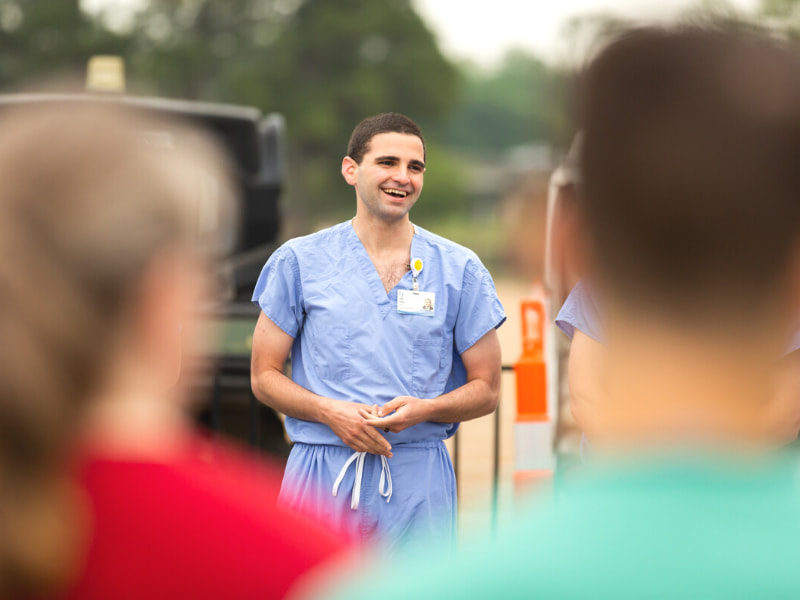
Fourth-year dental student Ambika Srivastava plans to work in public health dentistry after graduation and holds a master’s degree in public health with a background in epidemiology. She is working at the drive-through fairgrounds testing site helping with the collection of tests.
Rylee Stone, a traditional nursing student from Philadelphia in her third semester, also works at the fairgrounds in the greeting tent. She is often the first face patients see as they drive up to the site.
“For me, I have an interest to go into emergency medicine and triage, so this is an area I enjoy. I enjoy being that first voice for the patient when they come in,” she said.
Srivastava has been at the site since Monday. The first day was a test run, but on Tuesday, things hit home for the Meridian native.
“Tuesday we had a patient who was coughing so much they couldn’t even stop long enough for us to test them … it’s completely different seeing the person in the car and they’re so sick and look so ill,” Srivastava. “It really hit home that this is happening in Mississippi and never in a million years would I’ve thought I’d be here.”
Srivastava and the others’ days at the Fairgrounds start with an hourlong safety briefing, followed by eight hours of testing and a debriefing around 5:30 p.m. She and others don a gown, gloves, safety goggles, mask and face shield underneath a hot sun in temperatures reaching the high 80s.
She rotates between filling in one of the three roles of the testing team: the runner who brings the test kit from the tent, a scribe who verifies the patient’s information and the person doing the actual swabbing.
A supervisor constantly monitors the status of everyone’s personal protective equipment, or PPE. If a gown is slightly open or if there is a tear, or someone doesn’t wash their hands for the recommended 20 seconds, they are pulled aside and corrected.
When asked if she is scared to be on the front lines, Srivastava first says no, then reconsiders her response.
“I’m going to answer that with: I signed up for this. I’m a health care professional. If I don’t go out there and do it, who else will?” she said.
Other students echo that sentiment.
Sarah Dulske, a first-year medical student from Jackson, was desperate to help, so she started delivering groceries to people who didn’t need to get out last week. The acts of service helped take her mind off the uncertainties of her own life, including the disruption of her first year of medical school.
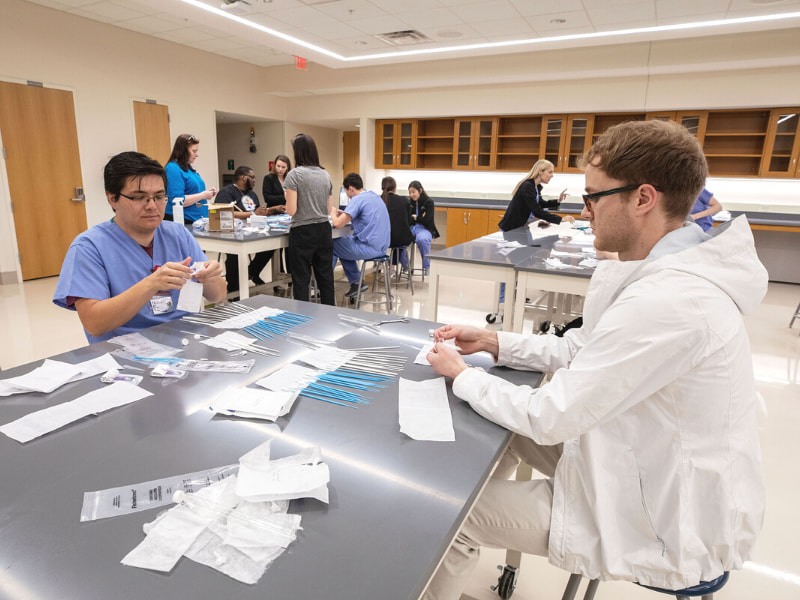
When she saw the email from Clark, she immediately responded and was assigned to work at the main hospital entrance screening hospital visitors and employees.
“I would rather put myself out there than someone who’s immunocompromised,” said Dulske. “And hopefully if more people like me get up and volunteer and help out then those that shouldn’t be out and about, we could limit that number.”
Her bravery and faith are getting her through, she said, but it is still “really hard.”
One day a group of about 12 people approached the hospital entrance with the intent of saying goodbye a loved one who was being taken off life support.
“When they had to tell the family only two of them could go up and say goodbye, I realized this is really, really serious,” she said.
The experience has impacted her less in terms of practical issues such as choosing a specialty and more in terms of how she will both live her life and practice medicine.
“It’s impacted upon me the importance of the service aspect of what we’re going into,” she said. “We took an oath on our short white coat ceremony day, and I think everybody looks at it as fun, and you don’t think you’re going to have to put that into action until later. But it’s made me realize we took an oath to protect the health of our population, and that doesn’t mean we have to wait until we get our long white coats.”

